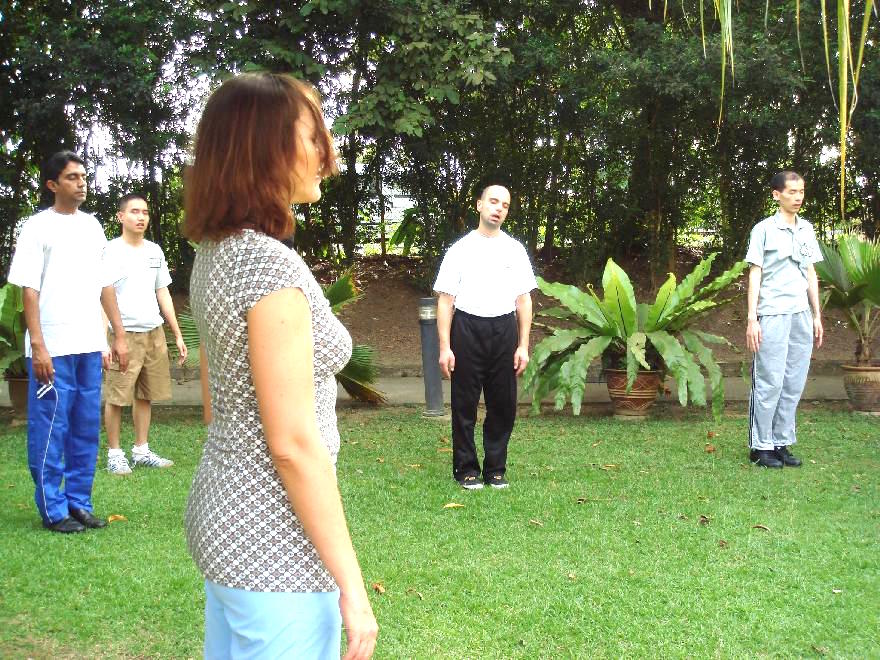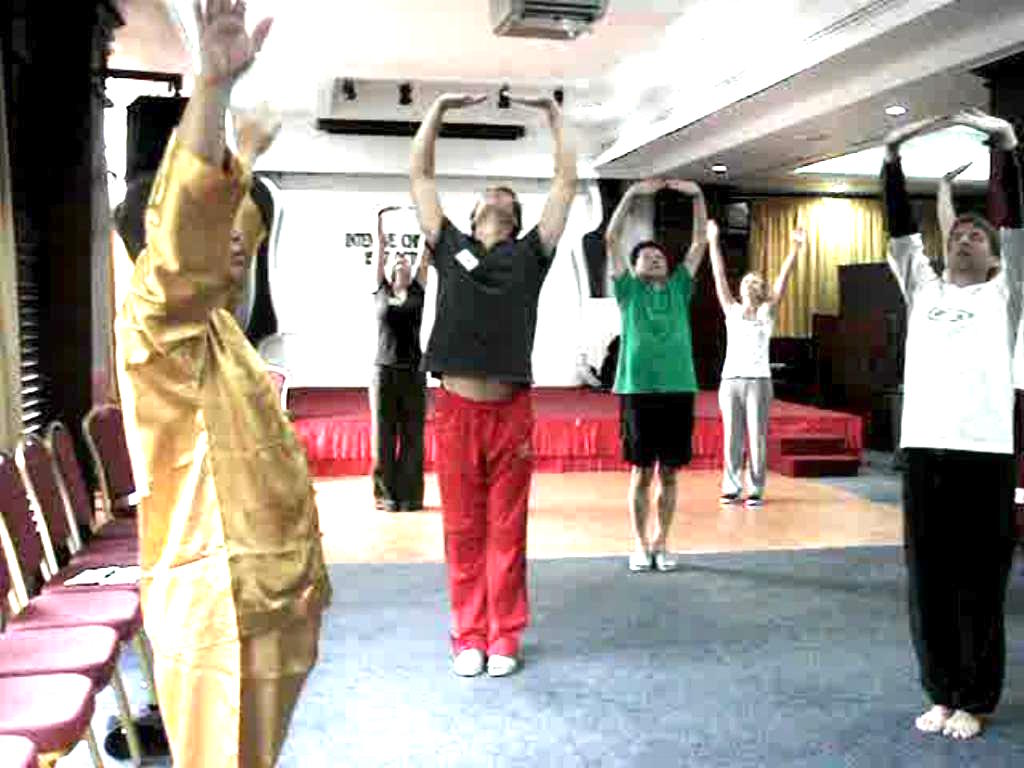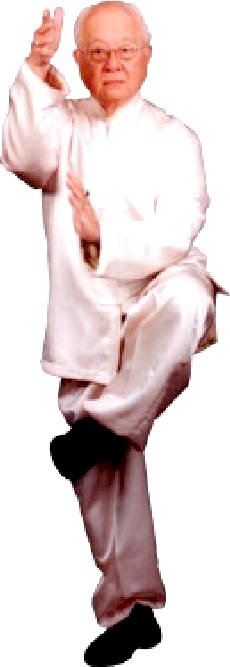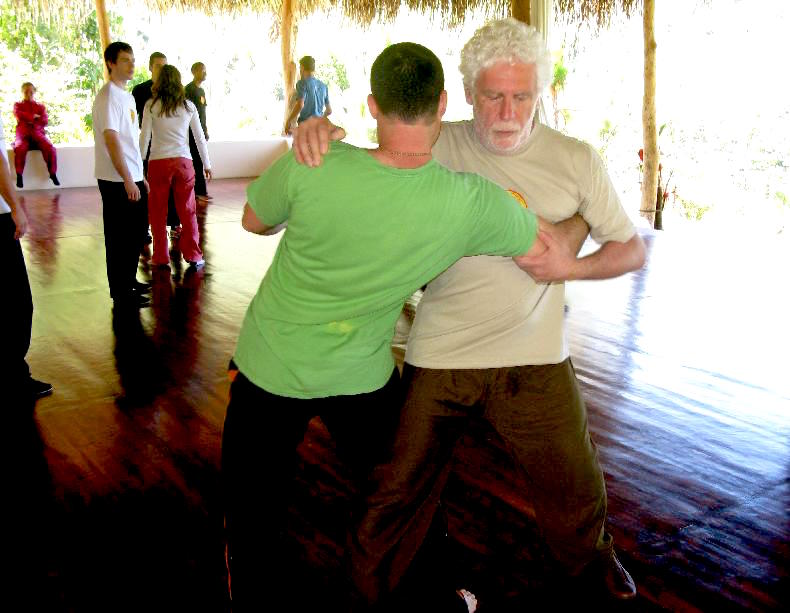SELECTION OF QUESTIONS AND ANSWERS
JULY 2010 PART 3

"Entering a chi kung state of mind" is a modern term. The classical term is "ru jing" which means "entering silence", or entering a higher state of consciousness.
Question 1
To those who think that Bruce Lee's training was just physical, I have some interesting quotes from Sifu Lee. "To perform the right technique in gung fu, physical loosening must be continued in a mental and spiritual loosening, so as to make the mind not only agile but free. In order to accomplish this, a gung fu man has to remain quiet and calm and to master the principle of no-mindedness (wu hsin).
"No-mindedness is not a blank mind that excludes all emotions; nor is it simply calmness and quietness of the mind. Although quietude and calmness are important, it is the 'non-graspiness' of the mind that mainly constitutes the principle of no-mindedness. A gung fu man employs his mind as a mirror - it grasps nothing and it refuses nothing; it receives but does not keep."
— Ake, Sweden
Answer
Thank you for the interesting information about Bruce Lee's training philosophy.
But this philosophy does not indicate that his training was not physical. To put his training philosophy into just a few words, what Bruce lee said was to be relaxed and not intellectualize when performing kungfu techniques.
While this mental state is essential for internal art training, it is also employed by external martial artists and other external athletes and performers if they want good results. A karate exponent, a weight-lifter, a violinist, for example, would not let his mind grasp at any thoughts when he produces good results in his performance.
Question 2
Sifu Wong, if I understand you correctly, in order to perform chi-kung properly one ought to have a "chi-kung frame of mind". Is this the same as wu hsin?
Answer
A chi kung state of mind may or may not be wu-xin (wu hsin).
A "chi kung state of mind" is a modern term. In classical times it was called "entering Zen", "entering Tao" or "entering Silence". The Western equivalent term is a "heightened level of consciousness".
There are many levels of a chi kung state of mind. At the basic level the mind is relaxed and focussed at the same time. At higher levels, the chi kung state of mind may be employed for visualization in some advanced chi kung exercises.
At still higher levels a chi kung state of mind may lead to a satori or spiritual awakening where reality is perceived and experienced transcendentally. For example, a practitioner at this very high level of a chi kung state of mind or spiritual awakening may find that he does not have a physical body or he may find himself far above observing his body and his classmates practicing below. I would like to say that these are not just empty words. Some of our students have had such experiences.
Wu-xin literally means "no heart", but actually means "no-mind". It refers to a mental state where thoughts do not arise.
Wu-xin can be at various levels too. At the basic level the practitioner's mind is clear and relaxed. At higher levels the practitioner experiences transcendental reality. He may be able to see across time and space. He may, for example, see what happened in the past or what will happen in future, or he may see what is happening at some distant places. At the highest level he merges with the Great Void, known as attaining Enlightenment in Buddhism or returning to God the Holy Spirit in Western terms.
At the basic level a chi kung state of mind is the same as wu-xin when the practitioner is mentally focussed and relaxed without thinking of anything. At higher levels where the practitioner uses visualization in his chi kung state of mind, it is not the same as wu-xin. But when he experiences reality transcendentally, a chi kung state of mind is the same as wu-xin. At the highest level where wu-xin leads to Enlightenment, it is not the same as a chi kung state of mind.

"Lifting the Sky" can bring many benefits
Question 3
After reading your question-answer section, I have completely abandoned practicing Small Universe Circulation. I now understand how stupid it is to think that one could learn advanced chi-kung from a book. I now only practice "Lifting the Sky" (with far better results) and the other exercises from your book, "The Complete Book of Zen".
Answer
It is wise of you not to attempt the Small Universe without learning personally from a competent teacher. Yes, "Lifting the Sky" can bring many wonderful benefits.
Question 4
I read an interesting article on Sifu Yap of the Five-Ancestor Style. He engaged a high ranking karate-ka in arm banging, resulting in the karate-ka's arms being black and blue but Sifu Yaps arms remained normal. As I have trained in karate before, I know how tough their arms are so this indeed proves the greatness of the Chinese arts.
Answer
Sifu Yap Cheng Hai is my siheng, or senior classmate, in my lineage from Sifu Chee Kim Thong, the Patriarch of Wuzu or Five-Ancestor Kungfu. I did not have the opportunity to train with him while I was learning Wuzu Kungfu because I learned from my Sifu's eldest son, Sifu Chee Boon Leong in Dungun (Malaysia) which was my Sifu's hometown, while Sifu Yap Cheng Hai helped my Sifu teaching in Kuala Lumpur. However, years later I met him in the Malaysian Federation of Chinese Martial Arts where he was the Chief Judge for competitions.
Sifu Yap Cheng Hai is well-known for his internal force. He can leisurely hold out his arms and two able-bodied adults can swing on them. Despite being highly accomplished in kungfu, he is a soft-spoken gentleman. He is also an accomplished feng shui master and successful banker.

Sifu Yap Cheng Hai of Wuzu Kungfu is well-known for his internal force. This picture is taken from http://www.ychacademy.com/htdocs/about-ych.shtml .
Question 5
What I find strange is that when karate practitioners are defeated they never ask "why"?
Answer
Some do ask "why?"
Many of them realize the damage they have done to themselves in their training and turn to Taijiquan hoping it may relieve them of their injuries. Unfortunately they often end up learning Taiji dance instead of genuine Taijiquan.
Many karate masters learn from me. They were full of pain and injuries when they started but after a few months they cleared their pain and injuries and now enjoy good health and vitality.
Question 6
I am very much interested in learning Kung Fu. I would like to know whether there is any age limit, and do you conduct any lessons in Kuala Lumpur.
— Mangey, Malaysia
Answer
There is no age limit in practicing kungfu.
Understandably, those who are too young (like babies), too weak or too old are not suitable. Nevertheless, my oldest student was 87 when he started learning Shaolin Kungfu from me.
I don't teach regular lessons in Kuala Lumpur. But my student, Lee Wei Joo, may do so. His mobile phone number is 016-3098821.
I would like to offer you some good advice. Define your aims and objectives in wanting to practice kungfu. Then learn from the best teacher within your resources who can help you fulfill your aims and objectives.

Age is not an important factor in kungfu. Sifu Riccardo Salvatore easily fells Sifu Eugene Siterman who is not only huge in size but about half Sifu Riccardo Salvatore's age.
Question 7
I took a course with Sifu Rama. It was the first time I felt chi flow,
— Julio, Ecuador
Answer
Sifu Rama is an excellent teacher, so your good result is expected.
Experiencing chi flow is crucial in chi kung practice -- a fact many chi kung practitioners do not know!
Why is chi flow so important? It is because it is not the chi kung exercises but the chi flow generated by the exercises that gives practitioners the benefits of chi kung, such as good health, vitality and lonveity. In other words, even if you practice genuine chi kung exercises but do not experience any chi flow, you would not obtain the benefits of chi kung.
As an ananlogy, it is not the job you do but the cash flow generated by the job you do that gives you economic benefits, like paying for your house and food, and enabling you to enjoy holiday trips. In other words, even if you do a good job but are not paid for the job, you would not derive any economic benefits.
Question 8
I had a strange feeling, and a calling to continue doing this. I really want to have some guidance in this matter.
Answer
It is quite normal that the first time you experience a chi flow, you may feel strange. Different people may have differenct sensations of chi flow. Some common sensations are a feeling of warmth or some tingling effects, especially at the finger tips. Some may feel as if insects crawling on their skin. Others may feel as if warm water or some mild electric current is flowing though them. Often their body may be swayed by the chi flow.
Whatever the sensation is, just let go and enjoy the chi flow.
Sifu Jose Antonio is our resident instructor in Ecuador. His e-mail address is jat@wahnam.e and his telephone numbers are 2894-895 / 2895 415. After learning from Sifu Rama in a course, it is highly advisable to continue your practice with Sifu Jose Antonio in a regular class
If Sifu Rama is your first teacher in Shaolin Wahnam, you should address him as your "Sifu", address Sifu Jose Antonio as your "Siheng" even if you later learn from him, and address me as your "Sigung".
LINKS
Selected Reading
- Perception is often More Important than Reality
- Is Chi Real? Can you Develop Internal Force?
- Taijiquan Defence against Fundamental Attacks
- Arrival at Chennai, the Old Madras
- Shoots, Lifts and Pin-Downs
